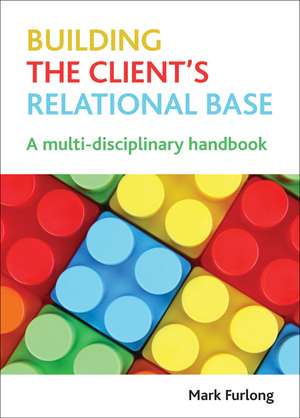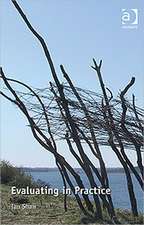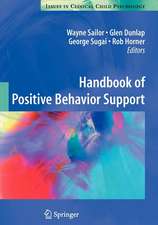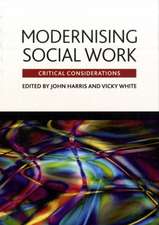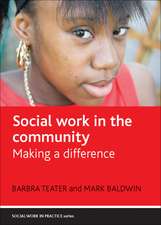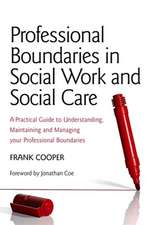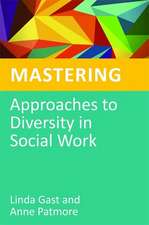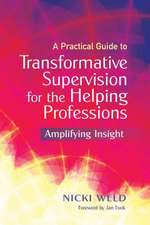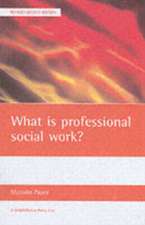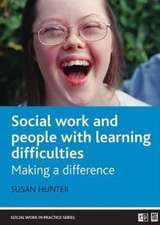Building the Client's Relational Base: A Multi-Disciplinary Handbook
Autor Mark Furlongen Limba Engleză Paperback – 26 feb 2013
This book makes a challenging—but hopeful—argument for anyone with a client relationship: sustainable and accountable interpersonal relationships are a precondition for health and well-being. It argues that there are always opportunities to deepen the quality and range of the client connection. Compellingly written, it brings a host of case studies to life, weaving insights from critical theory and social epidemiology into explorations of the practical actions that any professional committed to strengthening the relational base of their clients can take.
| Toate formatele și edițiile | Preț | Express |
|---|---|---|
| Paperback (1) | 291.06 lei 3-5 săpt. | |
| Bristol University Press – 26 feb 2013 | 291.06 lei 3-5 săpt. | |
| Hardback (1) | 781.65 lei 6-8 săpt. | |
| Bristol University Press – 26 feb 2013 | 781.65 lei 6-8 săpt. |
Preț: 291.06 lei
Nou
Puncte Express: 437
Preț estimativ în valută:
55.70€ • 60.48$ • 46.79£
55.70€ • 60.48$ • 46.79£
Carte disponibilă
Livrare economică 02-16 aprilie
Preluare comenzi: 021 569.72.76
Specificații
ISBN-13: 9781847428615
ISBN-10: 1847428614
Pagini: 320
Ilustrații: 31 figures, 3 tables
Dimensiuni: 171 x 241 x 18 mm
Greutate: 0.54 kg
Editura: Bristol University Press
Colecția Policy Press
ISBN-10: 1847428614
Pagini: 320
Ilustrații: 31 figures, 3 tables
Dimensiuni: 171 x 241 x 18 mm
Greutate: 0.54 kg
Editura: Bristol University Press
Colecția Policy Press
Notă biografică
Mark Furlong is a senior lecturer in the School of Health and Social Development at Deakin University in Australia.
Cuprins
List of vignettes, tables, figures, and reflective exercises
Acknowledgements
About the author
1 Introduction
Aims of the text
Policy and practice
Origins of the work
Structure of the book
2 Anchor points
You can’t ‘just do it’: practical theory
Social determinants of health
A process of individualization
Principles from feminist and critical scholarship
Generalizing about ‘normal’ and at-risk populations
3 Isolation and its accomplices
Are interpersonal attachments necessary?
Kinship libido
Loneliness and autonomy
Social inclusion and social exclusion
Dynamics of isolation
4 How are we getting along?
Insiders and outsiders
The experience of individualization
In and out of control
Vitamin me
Can the cycles of loneliness and isolation be interrupted?
5 Questioning professional norms
Painting ourselves into the picture
Agents of connection or separation?
Problematic professional norms
Practice wisdom and the culture of practitioners
6 The practitioner’s context
The organizational constraints to relationally focused practice
Conflicts between the cultures of clients and professionals
Every client has a culture
Accessing complex interpersonal data
7 Attitudes determine practice
Introduction
Attitudes inform practice: thinking relationally
- Reflective exercise 1: Clarifying your values
- Reflective exercise 2: Thinking about Lennie
- Reflective exercise 3: Separation and connection
Decision points in relationally oriented practice
The assessment process
Summary
8 Relationship-building skills
Getting started
Addressing the client as a relational being
Working systemically with individuals
Bringing in others: conjoint work and its variations
Being creative with confidentiality
Advanced relational work
Role of planners, managers, and supervisors
9 Learning to act well relationally
Working up an etiquette
- Reflective exercise 4: Leading questions
A simple relating exercise
Coaching clients
Five specific engagements to improve relational capacity
Mediated forms of relating
A complex example: working relationship building in a secure setting
10 Being an agent of cultural change
The business of practice
The practitioner as cultural actor
Fantasized and complex autonomy
Can traditional models of practice be relationship building?
Summing up
Endnotes
References
Subject index
Author index
Acknowledgements
About the author
1 Introduction
Aims of the text
Policy and practice
Origins of the work
Structure of the book
2 Anchor points
You can’t ‘just do it’: practical theory
Social determinants of health
A process of individualization
Principles from feminist and critical scholarship
Generalizing about ‘normal’ and at-risk populations
3 Isolation and its accomplices
Are interpersonal attachments necessary?
Kinship libido
Loneliness and autonomy
Social inclusion and social exclusion
Dynamics of isolation
4 How are we getting along?
Insiders and outsiders
The experience of individualization
In and out of control
Vitamin me
Can the cycles of loneliness and isolation be interrupted?
5 Questioning professional norms
Painting ourselves into the picture
Agents of connection or separation?
Problematic professional norms
Practice wisdom and the culture of practitioners
6 The practitioner’s context
The organizational constraints to relationally focused practice
Conflicts between the cultures of clients and professionals
Every client has a culture
Accessing complex interpersonal data
7 Attitudes determine practice
Introduction
Attitudes inform practice: thinking relationally
- Reflective exercise 1: Clarifying your values
- Reflective exercise 2: Thinking about Lennie
- Reflective exercise 3: Separation and connection
Decision points in relationally oriented practice
The assessment process
Summary
8 Relationship-building skills
Getting started
Addressing the client as a relational being
Working systemically with individuals
Bringing in others: conjoint work and its variations
Being creative with confidentiality
Advanced relational work
Role of planners, managers, and supervisors
9 Learning to act well relationally
Working up an etiquette
- Reflective exercise 4: Leading questions
A simple relating exercise
Coaching clients
Five specific engagements to improve relational capacity
Mediated forms of relating
A complex example: working relationship building in a secure setting
10 Being an agent of cultural change
The business of practice
The practitioner as cultural actor
Fantasized and complex autonomy
Can traditional models of practice be relationship building?
Summing up
Endnotes
References
Subject index
Author index
Recenzii
“This book is a refreshing re-examination of current practice and helpful in suggesting a variance in approach that might be effective in terms of outcomes for the client: it is well worth reading.”
“Mark Furlong has written a valuable sourcebook that will appeal to a wide range of practitioners who are seeking a new yet rigorous approach to their work with clients. It draws creatively on theories of individualism, isolation, inequality, and exclusion to make a strong case for practice that supports clients to build new relationships and strengthen existing ones.”
“Theoretically sophisticated and very practice oriented; Mark Furlong makes a significant contribution to promoting professional practices which aim to develop the client’s ‘relational self’. A very timely and engaging book.”
